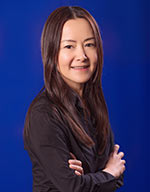Member Highlight: Dr. Yan Ye

Member Highlight: Dr. Yan Ye
Lab Director of Video Technology Lab, DAMO Academy, Alibaba Group (USA)
 Dr. Yan Ye is currently the Head of Video Technology Lab of Alibaba’s Damo Academy in Sunnyvale California. Prior to Alibaba, she held various technical and management and positions at InterDigital, Dolby Laboratories, and Qualcomm.
Dr. Yan Ye is currently the Head of Video Technology Lab of Alibaba’s Damo Academy in Sunnyvale California. Prior to Alibaba, she held various technical and management and positions at InterDigital, Dolby Laboratories, and Qualcomm.
Throughout her career, Dr. Ye has been actively involved in developing international video coding and video streaming standards in ITU-T SG16/Q.6 Video Coding Experts Group (VCEG) and ISO/IEC JTC 1/SC 29 Moving Picture Experts Group (MPEG). She is currently an Associate Rapporteur of the ITU-T SG16/Q.6, the Group Chair of INCITS/MPEG task group, and a focus group chair of the ISO/IEC SC 29/AG 5 MPEG Visual Quality Assessment. She has made many technical contributions to well-known video coding and streaming standards such as H.264/AVC, H.265/HEVC, H.266/VVC, MPEG DASH and MPEG OMAF. She is an Editor of the VVC test model, the 360Lib algorithm description, and the HEVC standard version 2 and version 3. She is a prolific inventor with hundreds of granted U.S. patents and patent applications, many of which highly cited by other researchers and inventors in the field of video coding. She is the co-author of more than 70 conference and journal papers.
Dr. Ye is currently a Distinguished Industrial Speaker of the IEEE Signal Processing Society. She was a guest editor of IEEE Transactions on Circuits and Systems for Video Technology (TCSVT) special sections related to the VVC standard. She currently co-chairs the technical program committee of IEEE Data Compression Conference (DCC) and the conference subcommittee of the IEEE Visual Signal Processing and Communication Technical Committee (VSPC-TC). Previously, she was an area chair of “multimedia standards and related research” of the IEEE International Conference on Multimedia and Expo (ICME) in 2021 and an organizing committee member of the IEEE International Conference on Multimedia and Expo (ICME) in 2018.
Dr. Ye is devoted to multimedia standards development, hardware and software video codec implementations, and deep learning-based video research. Her research interests include advanced video coding, processing and streaming, real-time and immersive video communications, AR/VR/MR, generative AI-based video coding, and learning-based video quality assessment.
Dr. Ye received her Ph.D. degree from the University of California, San Diego and her B.S. and M.S. degrees from the University of Science and Technology of China.
We approached Dr. Yan Ye to learn more:
Q: What challenges have you had to face to get to where you are today?
Everyone has challenges regardless of what kind of job one has. Throughout my career, my challenges have included:
- Keeping up with technological innovations in academic and industrial research world, and at the same time also keeping up with commercial trends in the industry. One’s ultimate goal is to make the connection and identify how to bridge the technological innovations with commercial applications in the video industry.
- Be an independent thinker, and don’t be afraid to speak up – this can feel daunting (considering I’m often one of very few women in the room), but one must overcome it and be willing to ask questions.
- Balancing family and work. My daughter was born soon after I finished my Ph.D. study. With young kids and just starting on my career and still looking for a track to define myself, life oftentimes felt overwhelming in the early days of my career. Even as the kids get older, keeping a good balance between family and work is always challenging. My husband and family have been tremendously supportive. Nurturing and maintaining a close bond helped to get me where I am today.
Q: What was the most important factor in your success?
So many factors: keeping young at heart, endless curiosity on new technologies, and maintaining a healthy support network including family, friends and colleagues.
Q: How does your work affect society?
Video plays such an important and essential role in our family life and social life: recording precious memories on our phones, keeping in touch with our friends and conducting remote work using video conferencing tools, watching movies in theaters and Netflix at home, so on and so forth. And video compression is one of the most fundamental technological building blocks of that commercial world. Most of our life aspects involving video wouldn’t have been possible without the generations of video codec standard that expands economy of scale and significantly brings down the cost of sending and receiving video. I consider myself very fortunate to have a chance to participate in the development of these highly-influential video standards.
Q: What is the key take-home message would you like the readers to remember from this interview?
Career is a long game. I’ve worked in the industry for twenty years, and I still consider myself mid-career. To keep going, I keep a keen eye out for new things. I am always ready to learn, and willing to ask questions in that process. I find it really helpful to have healthy “ecosystem” around me to help me learn and grow. Nowadays, my “ecosystem” includes many very smart young people who can teach me the latest technology trends such as AI. I am often a student of a current Ph.D. student, and I enjoy that very much.
Q: Failures are an inevitable part of everyone's career journey. What is the most important lesson you have learned from dealing with failures during your career?
When I joined Alibaba, I set my mind on forming a team to develop a hardware-based video encoder. I see many technical benefits of having a product like that: guaranteed throughput, more power efficient, and the ability to nicely complement software-based solutions. But, developing dedicated hardware takes more resources than we could put together – and we eventually moved on. From this unsuccessful attempt, I have learned a great lesson about product development: technological considerations alone are not sufficient. Instead, product development should be considered within a greater context together with business strategy and total cost of ownership. This was one of the most important lessons that I have learned, and it has helped me make better product roadmap judgements ever since.
Q: Although novelty and innovation are the most important factors technological advancements, new ideas often face significant resistance until proven effective. What advice would you offer on handling such pushback, particularly for those early in their careers?
The first thing is to understand why the pushbacks. Do they have reasons to resist, and is there good advice buried in the pushbacks? In other words, one must be willing to not only listen to, but hear what people on the opposite side have to say. After you’ve done that, if you still believe in your new idea, then seek mentorship and build support network to make it happen. Start with a proof of concept and expand from there. Understand that a great new idea is likely going to take significant effort, so you have to be ready to persevere with hard work and solve problems along the way. Finally, don’t be dogmatic about getting everything exactly your way. Instead, be pragmatic and open-minded about what you can achieve and the path to achieving it. You should consider it a great success if you can see a good portion (e.g. 70-80%) of your new idea through, where the remainder (e.g. 20-30%) could be coming from other people. When this finally becomes a successfully implemented idea, you will know that you are at a better place than when you started.

